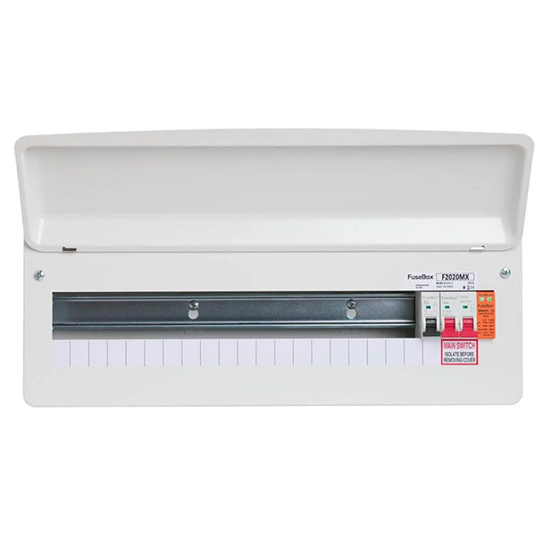A Comprehensive Overview to Maintaining Your RCBO CONSUMER UNITS Effectively
A Comprehensive Overview to Maintaining Your RCBO CONSUMER UNITS Effectively
Blog Article
The Function of Customer Units in Reliable Power Monitoring Solution
Consumer units are important to efficient power management systems, offering as the primary distribution factors for electric power within frameworks. The arrival of wise innovations has even more boosted their functionality, permitting for real-time information surveillance and nuanced energy usage analysis.
Understanding Customer Systems

Comprehending the function of customer units starts with acknowledging their necessary function in protecting electric systems. By isolating mistakes within certain circuits, consumer devices stop extensive failures and potential fire threats. This isolation is attained through making use of breaker that journey or integrates that blow when a mistake is spotted, thereby removing the electric circulation to the affected circuit.
In addition, customer devices assist in the well organized circulation of power, improving the performance of energy use. They enable the systematic monitoring of electrical lots, which can be particularly important in industrial and industrial settings where need can rise and fall significantly. Properly maintained consumer systems add to the durability of electric systems and assist in minimizing downtime triggered by electrical failings, ultimately supporting the seamless operation of energy-dependent centers.
Smart Technologies Integration

A crucial benefit of smart consumer devices is their ability to take advantage of advanced algorithms and artificial intelligence for predictive analytics. This permits preemptive modifications based on usage patterns, weather report, and other variables, significantly enhancing general efficiency. In addition, wise consumer devices promote need reaction programs, where energy use can be dynamically adjusted throughout peak durations to maintain the grid and reduce costs.
The combination of renewable power resources, such as solar and wind, is additionally structured through clever customer systems. By smartly managing the intermittency of these resources, these devices make sure a reputable and well balanced energy supply. Additionally, smart consumer devices improve user involvement by providing comprehensive understandings and remote control abilities with mobile applications, cultivating a more positive technique to power conservation and sustainability.
Tracking Power Usage
Building on the abilities of wise innovations assimilation, checking energy consumption becomes a crucial emphasis within power monitoring systems. By leveraging sophisticated metering facilities (AMI), real-time information on energy usage can my link be collected at granular levels, supplying valuable insights into usage patterns and peak demand periods.
Smart meters and Net of Things (IoT) tools play a critical function in this surveillance process. These tools can track energy use in real-time, sending data to centralized systems for evaluation. The collected data is after that processed with innovative algorithms to identify abnormalities, anticipate future intake, and suggest optimization approaches. Furthermore, cloud-based solutions offer scalable systems for storing and evaluating big datasets, promoting remote tracking and control.
The combination of these innovations not only encourages customers with detailed information about their power usage but also supports utility carriers in managing load circulation more efficiently. Ultimately, accurate and continuous monitoring is vital for attaining energy effectiveness, expense savings, and sustainability goals within energy management systems.
Optimizing Appliance Use

One effective technique includes recognizing optimal and off-peak hours to change energy-intensive activities, such as washing or dishwashing, to times when power need is lower. This not just decreases pressure on the grid yet additionally takes advantage of reduced energy tariffs. Additionally, incorporating equipment discovering formulas permits for anticipating maintenance, guaranteeing home appliances run at optimal efficiency and prolonging their life-span.
Power management systems can also include user-specific preferences and actions to tailor device usage schedules. additional hints As an example, wise illumination systems can adjust brightness based upon occupancy and all-natural light accessibility, while cooling and heating systems can preserve comfort degrees without excessive power use.
Promoting Sustainability
Advertising sustainability within power management systems includes not just improving effectiveness yet also cultivating environmentally accountable practices. Consumer devices are important to this process, as they give real-time data and control devices that enable individuals to check and lower their energy intake. By leveraging advanced technologies, customer units can determine energy-saving possibilities and assist in the assimilation of renewable energy sources like solar and wind power.
One essential aspect of advertising you can check here sustainability is enlightening customers on the advantages of liable energy usage. Via detailed understandings given by customer systems, users can make educated decisions that lessen their carbon impact. These systems can suggest optimal times for running high-energy appliances based on grid demand and renewable energy availability, thereby decreasing dependence on fossil fuels.
Moreover, customer devices sustain the adoption of wise grid technologies, which improve the overall efficiency and reliability of energy circulation. By enabling two-way interaction between consumers and utility providers, these systems can dynamically adjust to power needs, decreasing waste and advertising making use of lasting power techniques.
Conclusion
Consumer units, as integral parts of energy administration systems, significantly boost electrical security and performance within buildings through circuit defense and wise technology assimilation. Real-time data tracking and analysis promoted by these systems maximize power consumption and appliance usage. In addition, the unification of renewable energy resources promotes lasting methods, adding to decreased overall power consumption and reduced carbon footprints. Consequently, customer units play a vital role beforehand both energy performance and environmental sustainability.
Advancements in clever modern technologies have transformed the abilities of energy administration systems, especially with the assimilation of clever consumer systems.Building on the abilities of wise technologies combination, keeping an eye on power usage comes to be an important focus within energy administration systems.Effective appliance use optimization is a crucial element of energy administration systems, aiming to improve effectiveness and lower unnecessary energy consumption.Consumer units, as integral elements of energy management systems, substantially enhance electrical security and efficiency within buildings via circuit protection and clever innovation integration. Additionally, the consolidation of eco-friendly energy sources advertises sustainable practices, adding to minimized general energy usage and lower carbon impacts.
Report this page